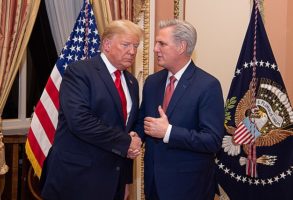Published March 25, 2016
Presidential candidates are given a lot of running room by voters and most journalists when it comes to policy pronouncements. No one expects them to publish a full budget or lengthy white papers with detailed legislative plans. But even by the loose standards of presidential campaigns, Donald Trump is setting a new low for vacuous rhetoric.
Trump’s supporters are drawn to him in part because they think he tells it like it is, unlike other politicians. But on the budget, as with trade and immigration, he is telling voters what they want to hear, even though it is not true, just as most conventional politicians have been doing for decades.
Trump wants to come across as a deficit and debt hawk. He has said repeatedly that the nation’s governmental debt is an indication of the incompetence of current and previous elected leaders. He rails against the budget deal struck between outgoing House speaker John Boehner and President Obama because it increased appropriations spending on defense and domestic programs in 2016. He hasn’t exactly promised a balanced budget, but he has said federal debt is a major problem he would address as president.
Trump’s other statements and positions, however, make it clear that he’s not inclined to implement a genuine conservative budget but is more likely to fall into the kind of procrastination and excuse-making that has led to today’s massive deficits and debt. What Trump implicitly promises is a closing of the gap between federal revenue and spending without any pain for ordinary voters. He claims that better management, led by him, is all it will take. It is the worst kind of wishful thinking and deception.
On entitlements, Trump is essentially in agreement with most Democrats. He says he won’t make any changes to Social Security or Medicare benefits. In previous years, he also said Medicaid shouldn’t be cut. He says he now favors converting Medicaid into a block grant to the states, although he has not promised that this switch would reduce federal costs.
It is not possible to address the nation’s fiscal challenges while protecting, now and in the future, entitlement spending — unless you are willing to impose massive tax hikes, such as those President Obama proposes.
In 1970, combined federal spending on Social Security, Medicare, and Medicaid was 3.7 percent of GDP. Today, spending on these programs, plus the new subsidies for insurance under Obamacare, accounts for more than 10 percent of GDP. And spending on these programs will reach 14.2 percent of GDP by 2040 unless they are changed to reduce their costs.
President Obama’s answer to the growing problem of entitlement spending is simple: more revenue. Over the past fifty years, federal revenue has averaged 17.7 percent of GDP. Tax hikes implemented during the Obama years would already push revenue up to 19.4 percent of GDP by 2040. But the president and his supporters want to raise taxes even more to cover the rising costs of entitlement programs.
Trump says he disagrees. He has proposed a tax cut of at least $10 trillion over the coming decade. But he has often said that he has no problem raising taxes on hedge-fund managers and other well-to-do Americans who he believes can and should pay more. Faced with massive deficits, and with a commitment not to touch entitlements, it is a safe bet than a President Trump would find raising taxes to solve the problem a very tempting proposition. And a lot of Democrats in Congress would concur.
Trump is for repealing Obamacare. But repeal of Obamacare would actually increase federal deficits unless the spending cuts in Medicare are left in place. And repeal will not be possible without a credible replacement plan, especially since Trump promises he will “take care of everyone.” (So far, Trump’s health-care proposals are little more than meaningless talking points.) A real replacement plan would cost less than Obamacare, but the savings would not be sufficient to close the large deficits projected for the coming years and decades.
Trump has also said he will find savings elsewhere in the budget. When pressed to be more specific, his answer is always the same: elimination of waste, fraud, and abuse. This is the most tired, canned answer in the book. Every politician who wants to pretend he’s serious about cutting spending without actually cutting spending resorts to denunciations of unspecified waste in the budget. The only surprise is that Trump hasn’t yet said he will also cut congressional pay and foreign aid.
Previously, Trump said he would find $300 billion in annual savings by negotiating down the prices Medicare pays for prescription drugs. This is, itself, problematic, given that such spending only amounts to $80 billion per year. But Trump seems now to have dropped the idea from his health-care plan, instead proposing to allow the importation of drugs at prices set by nationalized health systems. The latter proposal would probably reduce federal spending, but only by very small amounts.
The picture that emerges from Trump’s various statements on budgetary matters is not encouraging. Voters have heard him promise repeatedly that he would cut taxes and make no changes whatsoever to entitlement programs. This is certainly one reason he is popular with some voters. When pressed on how he would reconcile these commitments with large and growing deficits, he promises to target drug companies, rich people, and unspecified wasteful spending.
In other words, he gives answers that sound pretty much like what President Obama would say in response to the same questions.
— James C. Capretta is a senior fellow at the Ethics and Public Policy Center and a visiting fellow at the American Enterprise Institute.









